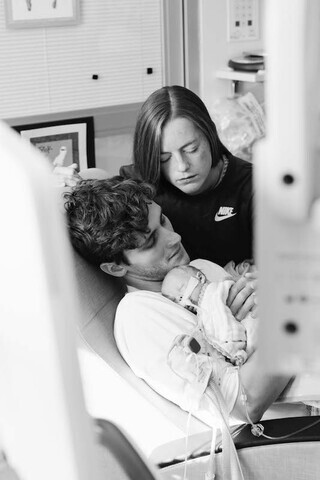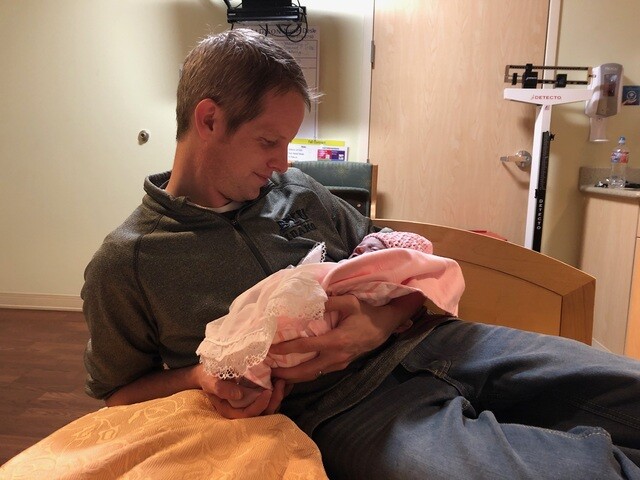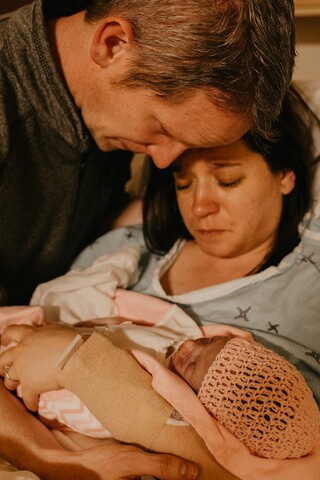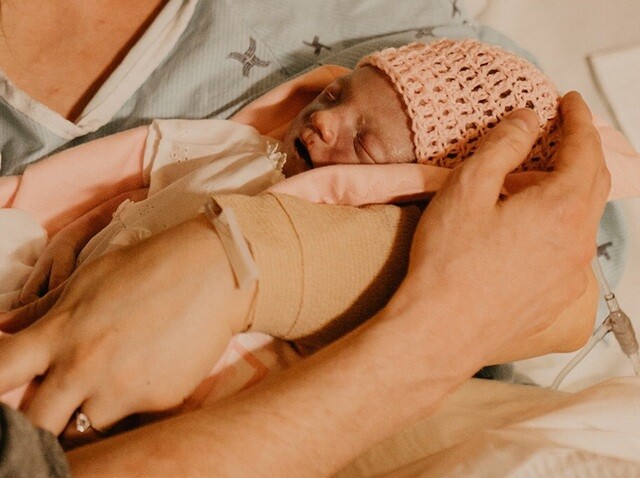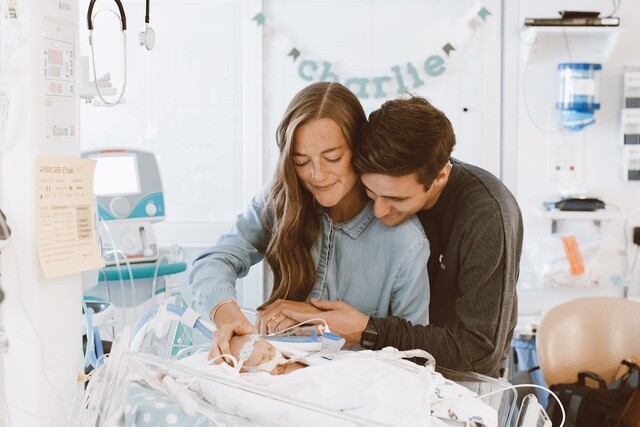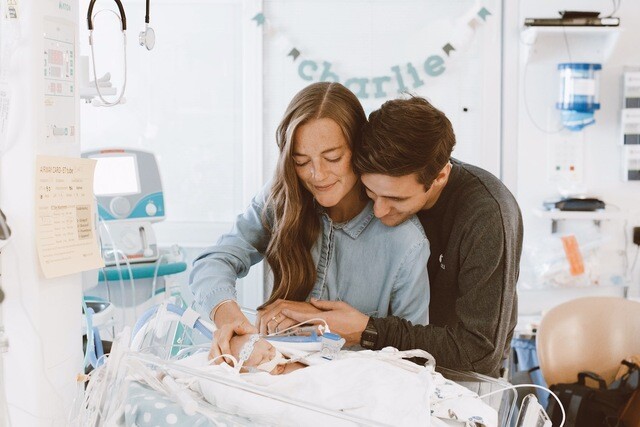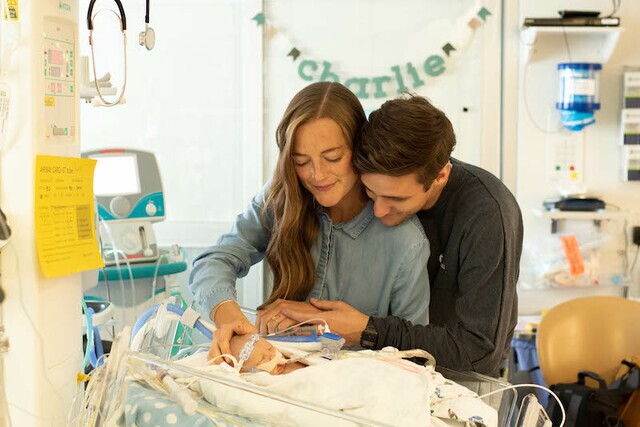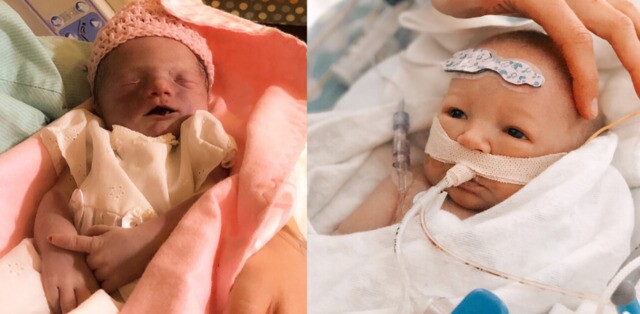At 4 pounds, 10 ounces, Grace fits perfectly in her parents’ arms, the light pink beanie on her head matching her pink silky skin after being delivered stillborn just weeks before her due date.
At 4 pounds, 7 ounces, Charlie has soft tufts of light blonde hair and deep blue eyes that watch his parents after he survived two heart surgeries and countless cardiac arrests. But after 12 long days of fighting, his parents realize that he isn’t going to make it home.
I never met Grace or Charlie personally. I wasn’t there for the long days at the hospital or the horrifying doctor appointments or the grief-filled months that followed. But I feel like I know their spirits—even if it’s just a little bit—by hearing the way their parents talked and cried over the tiny babies they brought to earth.
Knowing Grace and Charlie, for me, has been a bit like knowing heaven. And since opportunities like this don’t come around very often, I hope you don’t mind if I introduce you to them.
Grace
Two days before her daughter Grace was born, Ashlee Macfarlane had been busy making last-minute preparations. She found a used rocking chair to paint, set up a crib, prepared freezer meals, and sorted out clothes and blankets so everything would be ready before Grace came.
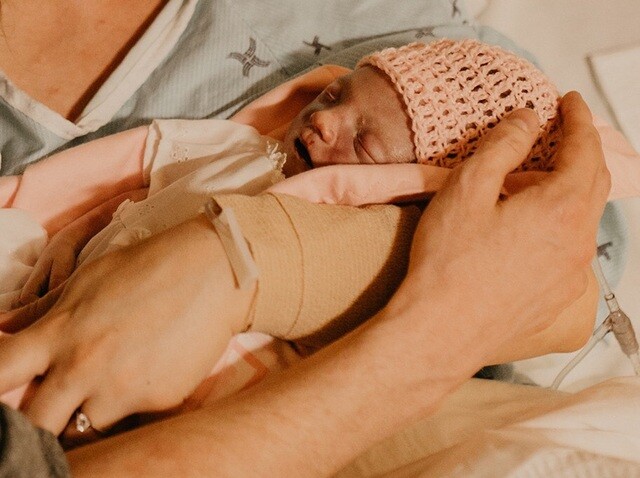
When she realized her baby hadn’t moved for a while, Ashlee lay down and counted the number of times Grace kicked. She felt movement, albeit softly. Assuming Grace was tired, Ashlee thought everything was normal until the next morning when she knew without a doubt that something was off.
Scheduling a doctor’s appointment for their earliest opening, Ashlee did a Google search and tried everything she could think of from taking a warm bath to shining a flashlight on her stomach to get a response. Nothing worked.
When she and her husband, Larz Macfarlane, went to the doctor that morning, the nurse couldn’t find a heartbeat. And while their doctor did an ultrasound, Ashlee knew deep down that it was futile.
“You could just see a little heart on the screen not moving, which was pretty horrible,” she says. “The rest is like a blur to me.”
The ugly logistics followed. The doctor confirmed they had lost the baby and walked them through the next steps they would have to take. Ashlee and Larz opted to deliver Grace over having a C-section, and Larz called family members to let them know what had happened. The next day their hospital room was filled to the brim with family members who had come to meet Grace.
When she was born on April 13, 2019, it was love at first sight. Ashlee cuddled and held Grace, Larz rocked and danced with her, and both felt the spirit of their daughter that day and for some time afterwards.
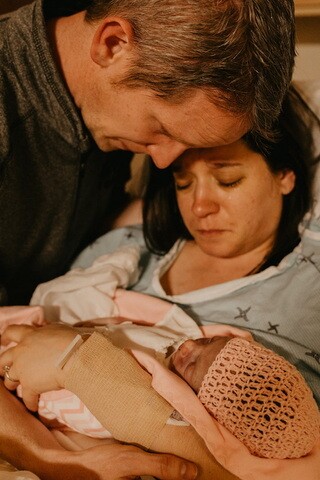
“We got to feel her in different ways and in different places . . . . And over the course of days, her tangible presence was gone and in weeks her visits had ended,” Larz said.
Still, the role of parenthood is very real for Ashlee and Larz. Over Christmas, they decorated a tree with ornaments and left it beside their daughter’s grave. And on more than one occasion they released a balloon for her in the cemetery.
“I need to remember her and be deliberate in making her a part of our holidays and making her a part of our prayers and daily life,” says Larz. “The hole is so clearly permanent and Grace-shaped in my heart. It’s much harder to keep her around when she’s not ministering to us as much, when she’s got her own thing to do in the Spirit World.”
For Ashlee and Larz, talking about Grace and their experiences has helped keep her memory alive.
“The biggest way I feel like I can continue to be her parent is . . . I can share her story and hopefully help other people to maybe find more faith or trust or hope,” Ashlee says.
Looking back, Ashlee says God prepared her for the loss of her child. A few times during her pregnancy, she would have a thought that Grace wasn’t going to make it. While she dismissed that idea, she knew God was aware of her child because of an impression she received that has given her solace.
“Out of nowhere [I] had this strong feeling like, ‘Her name is Grace.’ It wasn’t ‘Her name should be Grace or will be Grace,’ but ‘It already is Grace. And that’s because she’s a gift from me—from God.’”
One of the challenges in having a stillborn child is a lack of conversation surrounding the topic within the Church, says Larz, and there have been plenty of feelings of anger, frustration, and confusion that come with that. But as they’ve wrestled with their feelings, Larz says he’s learned it’s okay to struggle with God.
“God demands our heart,” he says. “He doesn’t demand that they’re yet sanctified like His. He can take anything and will respond with love and understanding. It’s okay to have a crisis of faith. It’s okay to be mad. God has shown us He doesn’t mind.”
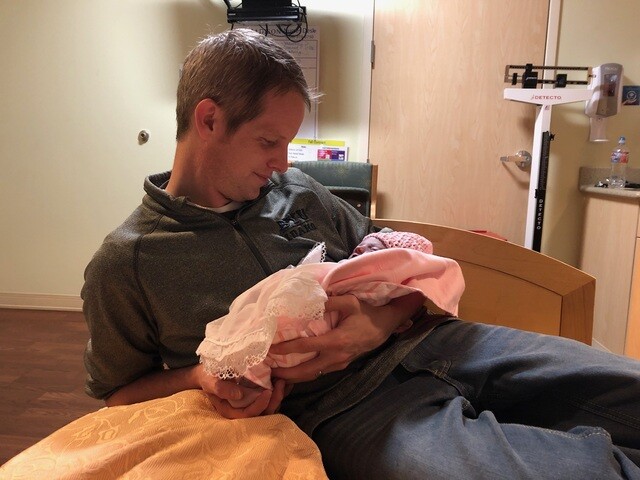
It’s most helpful when people ask about Grace, Ashlee adds—when others remember her, want to see pictures of her, or ask about their feelings for her, it lessens their burden of grief.
Moving forward, Ashlee and Larz are expecting their second little girl. But while they are looking forward to her arrival, it’s been a lesson in trust and faith as well.
“It’s been a lot harder than I think either of us thought it would be,” says Ashlee. “It’s like constant battle all day . . . every day: ‘Oh, she hasn’t moved. It’s been this long.’ Crazy things like that. I feel like it’s taken a lot of trust for me. That’s the only thing that even will calm me down sometimes from the intense panic attacks. We felt like we needed to do this.”
But through it all, God has had a hand in this experience, says Ashlee and Larz. Both have been able to find peace by relying on each other and having faith in the Atonement of Jesus Christ.
“Death isn’t the end . . . the Atonement’s not just for sin, but it’s also for overcoming death,” says Ashlee. “God had a plan for her specifically and that she was meant to be a gift, a gift to us, a gift to other people, and that helps me feel closer to her.”
Charlie
Meg and Morgan Evans discovered 20 weeks into their pregnancy that their baby had a rare condition called ebstein anomaly. The doctors told them there was a high likelihood their son would pass away in utero or would be stillborn.
So at 20 weeks, Meg and Morgan decided to give their child a name. This way they could put his name on the temple prayer roll and ask others to keep him in their prayers as well.
“I love his name. I love the name Charlie. And I love hearing people say his name and I love when people bring him up or if I see his name come up randomly,” says Meg, noting that people are sometimes afraid to remind her of him. “But literally we think about it every minute anyways. It’s not a reminder. But them talking about it reminds you that [he] lived and hearing them say his name is like, ‘He lived. And he still lives. His name lives on.’”
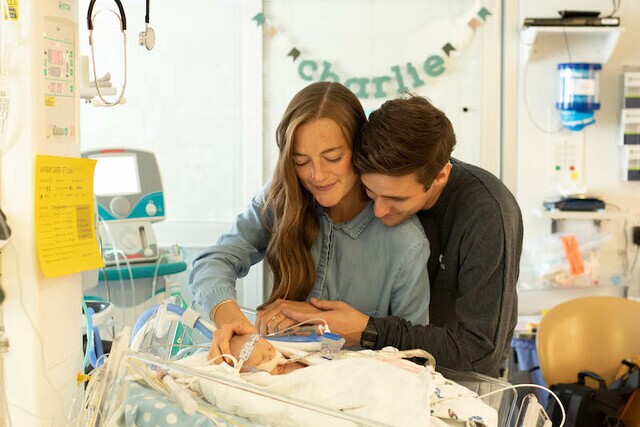
Charlie defied the odds until at 36 weeks, during a routine appointment, the doctors discovered he wasn’t responding like he normally would. Meg underwent an emergency C-section and Charlie was born on October 23, 2019.
In the days that followed, Charlie went through two heart surgeries. During the second, he went into cardiac arrest 22 times and was accordingly shocked 22 times to keep him going. In the days that followed, he seemed to improve and would track his parents with his eyes when they would talk to him—very unusual for a newborn.
“These were our greatest blessings from his life was this window of days, these four days that we had . . . were just the best and it was incredible,” says Morgan.
As Charlie rapidly declined, Meg and Morgan were faced with a difficult decision and ultimately chose not to prolong his suffering and have him removed from the ventilator.
“I really believe that there are worse things than death,” says Meg, who is a nurse at Primary Children’s in the cardiac ICU unit where Charlie stayed. “I wouldn’t want Charlie to suffer . . . I wouldn’t want to keep him here just for ourselves. . . . I feel like as a parent to let go is you giving up, but in a way you’re doing . . . what is [in] their best interest and sometimes that decision is to let them pass away.”
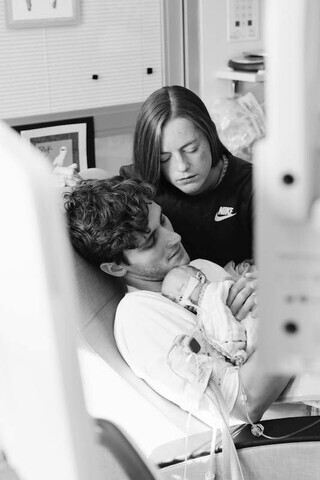
Meg and Morgan were filled with peace about the decision as they gave their will to God and felt the power of Christ’s Atonement in their lives.
“It’s the enabling power of the Atonement that allowed us to make that decision,” says Morgan. “Because of Christ, we will see our son Charlie again and we will be with him again and that while we are separated now . . . we’ll be with him one day.”
Since Charlie has passed away, Meg and Morgan have tried a number of things to cope with their grief including drives, walks, visits to Charlie’s grave, music, movies, and noise machines. But in the end, what they’ve found to be the most helpful is prayer, temple work, scripture study, and service. Still, the grief never fully leaves.
“I think . . . [that’s] a manifestation of love for your child,” says Meg. “Of course, that’s never going to go away because you love your child—and that grief is just that love.”
Despite her own confusion in this trial, Meg says she has found comfort in mourning with God.
“I know God is all knowing . . . and we don’t understand everything just like a child, but he has to be understanding that when we feel frustration and anger, those are okay in the time. . . . there’s a place for it,” she says. “I feel like He’s mourning with me and knowing that I’m not alone—He doesn’t ever leave me alone—it helped me to keep praying. . . . I know that God holds us in those moments.”

Meg and Morgan have been lifted up by the outreach of friends and family, whether that’s quotes, messages, or dinners that have been sent their way. One friend was even inspired to place twinkle lights up the pathway leading to the front door of the Evans home the night before Charlie died with a note that read, “Angels are round about you to bear you up.”
“When I opened up the door and saw that, I literally dropped to the floor in tears,” she says. “That was a testament to me that God works through other people and I know that God never has abandoned me and He was there, but He worked through her. She had that impression and she acted upon it and I needed that strength.”
While both Meg and Morgan are still in the middle of their own grief after losing Charlie, their son’s death has put life into perspective for them.
“Ultimately, it’s God’s plan, it’s a belief, and a faith, and a trust in His plan—that is what’s foremost in our life because of Charlie, and he’s helped us see that,” says Morgan. “This year, Meg and I are really focusing on hope. We’re trying to . . . learn about it and to develop it and to really have it be a central focus of our lives, and we know that because of Christ and His Atonement that we can hope to be an eternal family.”
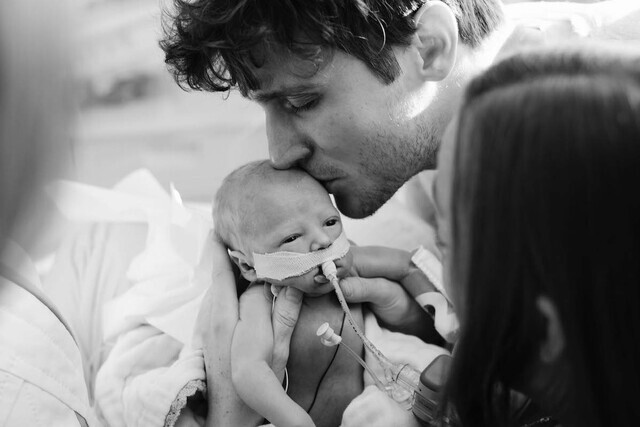
This experience has also brought Meg and Morgan together as they have relied on and trusted in God’s timing.
“We feel honored that God would bless us with a son, and now we honor God with our faith and trust in His will and timing,” says Morgan. “God has given us so much. He has given us our son, and He has taken him away, but we continue to trust Him knowing that His plan is better than what we might have imagined."
Hope
Grace and Charlie may not have been alive very long by earthly standards. Their names may not go down in history for doing great things. But perhaps life shouldn’t be measured in accomplishments and accolades, but in the love we leave behind. And in the case of Grace and Charlie, they left love behind in spades.
As I spoke with Ashlee, Larz, Meg, and Morgan, I realized that the stories of their children live on. Learning about those infants’ spirits helped me understand what it truly means to mourn with those that mourn—or in other words, to love with those that love. And while it might be hard to have those conversations, we need not be afraid of having them.
Grace and Charlie are in every breath their parents take, in every tear their loved ones shed. They are in every fleeting moment because they are a reminder that life isn’t just about today or tomorrow or the days that follow. Life is eternal. Eternity brings hope. And because of Christ, Grace and Charlie are still very much alive today.
And that makes their stories worth remembering.
Photos courtesy of Ashlee Macfarlane and Meredith Shatzer
